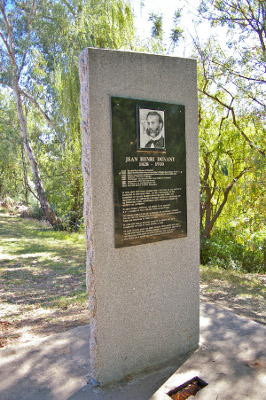Jean Henri Dunant was born on May 8, 1828 to a wealthy family in Geneva Switzerland. He learned religious and charitable values from his mother and father who very active in the community. Early on, Dunant worked full-time and traveled Europe as a representative of the Young Men's Christian Association (YMCA).

His first venture into business came at the age of 26 when he became a representative of the Compagnie genevoise des Colonies de Setif in North Africa and Sicily. His time and observations there led to his first published book entitled "Notice sur la Regence de Tunis [An Account of the Regency in Tunis].
After the conclusion of his representative job, he thought up a great financial scheme, making himself president of a financial and industrial company in Algeria with hopes of exlpoiting a large piece of land. Needing water rights for the land, he decided he would go to Emperor Napolean III himself for the approval. This would lead to a life changing awakening for Dunant.
At the time, Napolean was in the middle of directing the French armies and the Italians in driving the Austrians out of Italy. Dunant traveled to Napolean's headquarters near the northern Italian town of Solferino and arrived during one of the bloodiest battles of the 1800's. This led to the publishing of his second, and most famous, book entitled "A Memory of Solferino". In the book he discussed the bloody events of the battle and it's aftermath, along with a plan on how to provide care for those wounded in battle. Included in his plan was the idea of providing neautral care to those wounded in battle, regardless of what side they were on.
His book led to the appointment of a committee of five, including Dunant, to examine the possibility of Dunant's plan. This committee called for an international conference which resulted in the founding of the Red Cross. Dunant devoted his time and a tremendous amount of money to the cause, travelling most of Europe and speaking with government representatives. This would lead to the signing of an international treaty on August 22, 1864. Known today as teh Geneva Convention, this treaty guaranteed neutrality to sanitary personnel, to expedite supplies for their use, and to adopt a special identifying emblem, which in virtually all instances was a red cross over a field of white. While Dunant was extremely happy with the result, he would still continue to work to extend the scope of the red cross to cover naval personnel in wartime, and in peacetime to alleviate the hardships caused by natural catastrophes.
While Dunant was focusing on his humanitarian efforts, his business ventures virtually collapsed. He became bankrupt as a result and was alienated from his hometown of Geneva since many of his friends were greatly affected by the business disaster. After leaving Geneva, he spent his next years in extremely poor living conditions; often sleeping outside and eating bread crust to survive. He disappeared from the world into solitude for about twenty years.
After staying in various different places, he ended up in a small swiss village called Heiden. In 1890, a teacher who found him there, informed the world that he was still alive. The world however took little note. He became ill and was moved to hospice at Heiden in 1892. He stayed in room 12, where he would end up spending the remainder of his life. In 1895, he was re-discovered again and ended up receiving prizes and awards of all sorts including one-half of the first Nobel Piece Prize in 1901 for his life's work towards humanity. He died in 1910, bequeathing his legacies to those who cared for him in the hospital, also leaving a free bed available to the sick among the poorest people in the village. He left the remainder to philanthropic enterprises in Norway and Switzerland.
